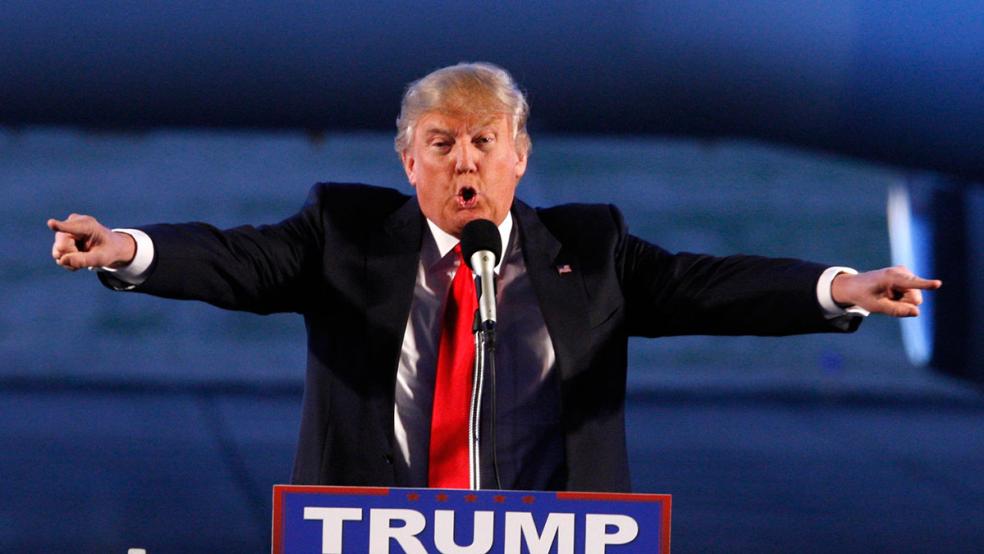The Republican Party is in the midst of an ugly divorce, and the main question is, who gets to keep the house?
To the extent that there is some brand equity left in the Republican Party after the last few months in which a real estate developer turned reality-TV star turned demagogue has been allowed to become its public face, the time to save it is probably running out. But on Sunday, GOP presidential frontrunner Donald Trump handed the party’s leaders what might be their best opportunity to keep their hold on the GOP and force Trump and his most rabid supporters into the political wilderness.
Related: Trump and Christie Steal Rubio’s Thunder
Trump, appearing on CNN’s State of the Union, was asked three times by host Jake Tapper if he would decline the endorsement of former Ku Klux Klan leader David Duke and other white supremacists. Three times, Trump demurred, absurdly claiming that he wasn’t familiar enough with Duke or the KKK to take a position.
It may or may not have been the worst moment of the Trump campaign from a public relations perspective. For example, it didn’t stop tens of thousands of people from filling a Madison, Alabama football stadium to watch him speak on Sunday evening. Nor did it deter U.S. Sen. Jeff Sessions of Alabama, who has had his own trouble with remarks about the KKK, from endorsing Trump at the rally.
However, heading into the crucial Super Tuesday primaries tomorrow, it gave the GOP a powerful chance, if its leaders will take it, to repudiate his candidacy on the grounds of racism. Or, at least, openly pandering to avowed racists.
To be clear, this would be a strategic choice. There are, after all, myriad reasons to repudiate Trump’s candidacy: his demonstrated lying, his appeals to xenophobia, fear and ignorance -- the list goes on. But for the leaders of the party to attack Trump on many of those points has always been problematic.
Related: With a Stream of Misspelled Tweets, Trump ‘Chocks’ Off Debate Critics
Part of Trump’s act involves presenting himself as a foe of the Republican Establishment. He insists that he will shake up a party that has ignored his supporters’ wishes and needs. Were that party, as an Establishment, to attack him on a broad front, it would only reinforce his narrative.
Trump’s xenophobic rants appeal to his supporters’ very real concerns about illegal immigration, and the party can’t afford to belittle that. Pointing out that he’s lying to them with impunity suggests that GOP leaders think Trump’s Republican supporters are stupid. Blasting him for promising to order the armed forces to commit war crimes in the battle against ISIS risks being seen as ignoring their fear of terrorism.
But going after Trump for being racist – or at least associating himself with people who support racism – is a narrower target. Many people willing to defend their candidate’s positions on immigration and terrorism would be far less comfortable publicly defending someone who is seen as appealing directly to racism.
Would it cost the GOP some of its voters? Yes, undoubtedly. But here’s the thing: The Republican Party has already been dramatically changed by Trump’s candidacy – that just isn’t apparent yet.
Related: Four Major Blind Spots Trump Voters Need to Correct
Should Trump win the nomination, many members of the GOP, disgusted with the tone and substance of his campaign, are going to sit out the election rather than vote for him, or bolt the party altogether. There are already very public rumblings about efforts to form a separate conservative party.
If Trump scores a major victory on Tuesday and in the major states that vote on Mar. 15, but loses the nomination, he’s not going to go quietly. Whether it happens in the primary itself or in a brokered convention, it’s a virtual certainty that if Trump is denied the nomination, he will claim that the party elites conspired against him and that the nominee, whoever it is, is illegitimate. Many of his supporters, already angry at the GOP elites before Trump even entered the race, will stay home in November.
In the end, Trump has effectively forced a choice on the Republican Party. That choice isn’t about whether or not the 2016 election will splinter the party – that’s already happened. The only real question which lines it will splinter along.
The members of the GOP who value its history as the party of Lincoln, Teddy Roosevelt and Reagan, might prefer to hang on to the party name and to the voters they don’t mind being publicly associated with rather than striking out to create a new conservative brand.
Related: If Voters Keep Digging, They’ll Find Trump Buried Some Really Bad Deals
The price of holding on to the Republican Party’s brand equity, though, will be the purposeful alienation of Donald Trump’s most rabid supporters from the GOP.
The next move belongs to the party’s elders and to Republican National Committee Chairman Reince Priebus. The RNC has, understandably, been reluctant to intervene in a primary election. But if Priebus likes the view from his office, it might be time to break that precedent.





